Winamp
Winamp is a media player for Microsoft Windows originally developed by Justin Frankel and Dmitry Boldyrev[5][6][7] by their company Nullsoft, which they later sold to AOL in 1999 for $80 million. It was then acquired by Radionomy in 2014. Since version 2 it has been sold as freemium and supports extensibility with plug-ins and skins, and features music visualization, playlist and a media library, supported by a large online community.
 Long-time Winamp logo (top) and redesigned 2017 logo (bottom) | |
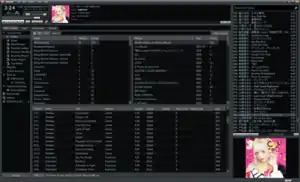 Winamp 5.8 featuring the Bento skin | |
| Original author(s) | Nullsoft |
|---|---|
| Developer(s) | Radionomy |
| Initial release | April 21, 1997 |
| Stable release | 5.8.3660 (October 19, 2018) [±] |
| Written in | C[1]/C++[2][3] |
| Operating system | Windows, Android, DOS (DOSamp),[4] Mac OS (MacAmp) |
| Size | 16.3 MB |
| Available in | 18 languages |
List of languages English, Simplified Chinese, Traditional Chinese, German, Spanish, French, Italian, Japanese, Korean, Dutch, Polish, Brazilian Portuguese, Russian, Romanian, Swedish, Turkish, Hungarian, Indonesian | |
| Type | Media player |
| License | Proprietary freeware |
| Website | winamp |
Version 1 of Winamp was released in 1997, and grew quickly popular with over 3 million downloads,[8] paralleling the developing trend of MP3 (music) file sharing. Winamp 2.0 was released on September 8, 1998. The 2.x versions were widely used and made Winamp one of the most downloaded Windows applications.[9] By 2000, Winamp had over 25 million registered users[10] and by 2001 it had 60 million users.[11] A poor reception to the 2002 rewrite, Winamp3, was followed by the release of Winamp 5 in 2003, and a later release of version 5.5 in 2007. A now-discontinued version for Android was also released, along with early counterparts for DOS and Macintosh.
Winamp 5.8 (written as Winamp 5.) was leaked to the general public in 2018. The Radionomy team decided to release the version themselves to maintain security levels.[12] Radionomy later announced their intention to eventually release Winamp 6.[13]
Features
- Playback formats
- Winamp supports music playback using MP3, MIDI, MOD, MPEG-1 audio layers 1 and 2, AAC, M4A, FLAC, WAV, and WMA. Winamp was one of the first widely used music players on Windows to support playback of Ogg Vorbis by default.[14] It supports gapless playback for MP3 and AAC and ReplayGain for volume leveling across tracks. CD support includes playing and importing music from audio CDs, optionally with CD-Text, and burning music to CDs. The standard version limits maximum burn speed and datarate; the "Pro" version removes these limitations.[15] Winamp supports playback of Windows Media Video and Nullsoft Streaming Video. For MPEG Video, AVI, and other unsupported video types, Winamp uses Microsoft's DirectShow API for playback, allowing playback of most of the video formats supported by Windows Media Player. 5.1 Surround sound is supported where formats and decoders allow.[16]
- Media Library
- At installation, Winamp scans the user's system for media files to add to the Media Library database.[17] It supports full Unicode filenames and Unicode metadata for media files.[18] In the Media Library user interface pane, under Local Media, several selectors (Audio, Video, date, and frequency) permit display of subsets of media files with greater detail.[17]
- Adding album art and track tags
- Get Album Art permits retrieval of cover art, and confirmation before adding the image to the database. Autotagging analyzes a track's audio using the Gracenote service and retrieves the song's ID2 and ID3 metadata.[17]
- Podcatcher
- Winamp can also be used as an RSS media feeds aggregator capable of displaying articles, downloading, or playing such content as streaming media. SHOUTcast Wire provides a directory and RSS subscription system for podcasts.[17][19]
- Media player device support
- Winamp has extendable support for portable media players and Mass Storage Compliant devices, Microsoft PlaysForSure, and ActiveSync, and syncs unprotected music to the iPod.[17][20]
- Media Monitor
- Winamp Media Monitor allows web-based browsing and bookmarking music blog websites and automatically offering for streaming or downloading all MP3 files there. The Media Monitor is preloaded with music blog URLs.[17]
- Winamp Remote
- Winamp Remote allows remote playback (streaming) of unprotected media files on the user's PC via the Internet. Remote adjusts bitrate based on available bandwidth, and can be controlled by web interface, Wii, PlayStation 3, Xbox 360, and mobile phones.[17]
- Plug-ins
- In February 1998, Winamp was rewritten as a "general-purpose audio player"[21] with a plug-in architecture. This feature was received well by reviewers.[22][23] Development was early, diverse, and rapid: 66 plugins were published by November 1998.[24] The Winamp software development kit (SDK) allows software developers to create seven different types of plug-ins.[25]
- Input: decodes specific file formats.
- Output: sends data to specific devices or files.
- Visualization: provides sound activated graphics.
- DSP/Effect: manipulates audio for special effects.
- General Purpose plug-ins add convenience or UI features (Media Library, alarm clock, or pause when logged out).
- Media Library plug-ins add functions to the Media Library plug-in.
- Portables plug-ins support portable media players.[26]

- Plug-in development support increased Winamp's flexibility for, for example, a plethora of specialized plug-ins for game console music files such as NSF,[27] USF, GBS,[28] GSF,[29] SID,[30] VGM,[30] SPC,[30] PSF, and PSF2.
- Skins
- Skins are bitmap files which alter the aesthetic design of the Winamp graphical user interface (GUI) and can add functionality with scripting.[31] Winamp published documentation on skin creation[32] in 1998 with the release of Winamp 2 and invited Winamp users to publish skins on Winamp.com. As of 2000 there were nearly 3,000 Winamp skins available.[33][34] The ability to use skins contributed to Winamp's popularity early in MP3 development.[35] With the increasing number of available skins, genres or categories of skins developed, such as "Stereo", "Anime", and "Ugly". Online communities of skin designers such as 1001Skins.com and Skinz.org have contributed thousands of designs;[36][37] also at GnomeArt.[38] Designers see skins as an opportunity to be creative:[39] nontraditional examples have included Klingon, iPod, and Etch-a-sketch designs.[40] The Winamp skin format is the most popular, the most commonly adopted by other media player software, and is usable across platforms.[41] One example is the XMMS player for Linux and Unix systems, which can use unmodified Winamp 2 skin files.[42][43] Winamp 5 supports two types of skins – "classic" skins designed to Winamp 2 specifications (static collections of bitmap images), and more flexible, freeform "modern" skins per the Winamp3 specification. Modern skins support true alpha channel transparency, scripting control, a docked toolbar, and other innovations to the user interface.[44]
History
Initial releases
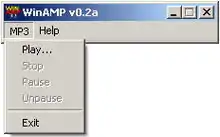
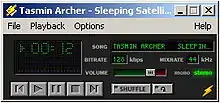
Winamp was first released in 1997, when Justin Frankel and Dmitry Boldyrev,[5][6][7] formerly students at the University of Utah, integrated their Windows user interface with the Advanced Multimedia Products ("AMP") MP3 file playback engine.[45] The name Winamp (originally spelled WinAMP) was a portmanteau of "Windows" and "AMP".[46] The minimalist WinAMP 0.20a was released as freeware on April 21, 1997.[47][48] Its windowless, menu bar-only interface showed only play (open), stop, pause, and unpause functions. A file specified on the command line or dropped onto its icon would be played. MP3 decoding was performed by the AMP decoding engine developed by Advanced Multimedia Products co-founder Tomislav Uzelac, which was free for non-commercial use.[49] It was compatible with Windows 95 and Windows NT 4.0. Winamp was the second real-time MP3 player for Windows, the first being WinPlay3.[50]
WinAMP 0.92 was released as a freeware in May 1997. Within the standard Windows frame and menu bar, it had the beginnings of the "classic" Winamp GUI: dark gray rectangle with silver 3D-effect transport buttons, a red/green volume slider, time displayed in a green LED font, with track name, MP3 bitrate, and "mixrate" in green. There was no position bar, and a blank space where the spectrum analyzer and waveform analyzer would later appear. Multiple files on the command line or dropped onto its icon were enqueued in the playlist.
Winamp 1

Version 1.006 was released June 7, 1997,[8][51] renamed "Winamp", i.e., with "amp" now in lowercase. It showed a spectrum analyzer and color-changing volume slider, but no waveform display. The AMP non-commercial license was included in its help menu.
According to Tomislav Uzelac, Frankel licensed the AMP 0.7 engine June 1, 1997.[52] Frankel formally founded Nullsoft Inc. in January 1998 and continued development of Winamp, which changed from freeware to $10 shareware.[8] Despite the fact that there would be no extra features by paying $10, Winamp's popularity and warm reception brought Nullsoft $100,000 a month that year from $10 paper checks in the mail from paying users.[11]
In March, Brian Litman, managing co-founder with Uzelac of Advanced Multimedia Products, which by then had been merged into PlayMedia Systems, sent a cease-and-desist letter to Nullsoft, claiming unlawful use of AMP.[53] Nullsoft responded that they had replaced AMP with Nitrane, Nullsoft's proprietary decoder, but Playmedia disputed this. Third-party reviews found that Nitrane had bugs that resulted in playing back MP3s incorrectly, and that this resulted in unstable tones being added to the playback, and undoubtedly therefore violated the ISO standard. This also means that Nitrane was unlikely to have been based on the AMP software, and was more likely evidence of a hastily written MP3 decoder that didn't concern itself with standards compliance.[54]
Version 1.90, released March 31, 1998, was the first release as a general-purpose audio player, and documented on the Winamp website as supporting plugins, of which it included two input plugins (MOD and MP3) and a visualization plugin.[21] The installer for Version 1.91, released 18 days later, included wave, cdda, and Windows tray handling plugins, as well as the famous Wesley Willis-inspired DEMO.MP3 file "Winamp, it really whips the llama's ass".[55][56]
By July 1998, Winamp's various versions had been downloaded over three million times.[8]
Winamp 2

Winamp 2.0 was released on September 8, 1998. The new version improved the usability of the playlist, made the equalizer more accurate, and introduced more plug-ins. The playlist and equalizer windows now matched the player's skin and could be moved around and "docked" anywhere.
The 2.x versions were widely used and made Winamp one of the most downloaded pieces of software for Windows.[9] By the end of 1998, there were already over 60 plugins and hundreds of skins made for the software.[57]
PlayMedia filed a federal lawsuit against Nullsoft in March 1999. In May 1999, PlayMedia was granted an injunction by Federal Judge A. Howard Matz against distribution of Nitrane by Nullsoft, and the same month the lawsuit was settled out-of-court with licensing and confidentiality agreements.[48] Soon after, Nullsoft switched to an ISO decoder from the Fraunhofer-Gesellschaft, the developers of the MP3 format.
Winamp 2.10, released March 24, 1999, included a new version of the "Llama" demo.mp3 featuring a musical sting and bleating.
Nullsoft was purchased by AOL in June 1999 for $80 million in stock, with Nullsoft becoming a subsidiary.[10][58] AOL itself merged with Time Warner in 2000.
Nullsoft relaunched the Winamp-specific winamp.com in December 1999 to provide easier access to skins, plug-ins, streaming audio, song downloads, forums, and developer resources.
As of June 22, 2000, Winamp surpassed 25 million registrants.[10]
Winamp3
The next major Winamp version, Winamp3 (so spelled to include mp3 in the name and to mark its separation from the Winamp 2 codebase), was released on August 9, 2002. It was a complete rewrite of version 2, newly based on the Wasabi application framework, which offered additional functionality and flexibility. Winamp3 was developed parallel to Winamp 2, but "many users found it consumed too many system resources and was unstable (or even lacked some valued functionality, such as the ability to count or find the total duration of tracks in a playlist)".[59][60] Winamp3 had no backward compatibility with Winamp 2 plugins, and the SHOUTcast sourcing plugin was not supported. No Winamp3 version of SHOUTcast was ever released.
In response to users reverting to Winamp 2, Nullsoft continued the development of Winamp 2 to versions 2.9 and 2.91 in 2003,[61] even alluding to it humorously.[62] The beta versions 2.92 and 2.95 were released with the inclusion of some of the functionality of the upcoming Winamp 5. During this period the Wasabi cross-platform application framework and skinnable GUI toolkit was derived from parts of the Winamp3 source code. For Linux, Nullsoft released an alpha version of Winamp3 on October 9, 2001, but has not updated it despite continued user interest.[63]
During this time Winamp faced stiff competition from Apple's iTunes.[11]
Winamp 5
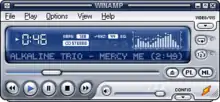
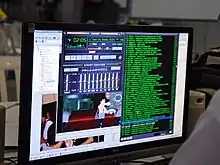
Winamp 5 was based on the Winamp 2 codebase, but with Winamp3 features such as modern skins incorporated via a plugin,[64] thus incorporating the main advantages of both products. Regarding the omission of a version 4, Nullsoft joked that "nobody wants to see a Winamp 4 skin" ("4 skin" being a pun on foreskin).[65] It was also joked that "Winamp 5 is so good they skipped a number" and "Winamp 2+3=5,".[66] Winamp 5.0 was released in December 2003. A blue themed "Modern" skin became the default interface. The media library was improved, CD burning and ripping was introduced, and other additions.
The original Nullsoft team quit in 2004. As of version 5.1, Winamp development is credited to Ben Allison (Benski) and Maksim Tyrtyshny.[67]
From version 5.2 onwards, support for synchronizing with an iPod is built-in.[68]
Winamp 5.5
Winamp 5.5: The 10th Anniversary Edition was released on October 10, 2007,[69] ten years after the first release of Winamp (a preview version had been released on September 10, 2007). New features to the player included album art support, improved localization support (with several officially localized Winamp releases, including German, Polish, Russian, and French), and a new default interface skin called "Bento" which unlike the previous skins is a unified player and media library in one window as opposed to a multi-window interface.[70] This version dropped support for Windows 9x.[17][71]
Winamp 5.6
Winamp 5.6 was released in November 2010[72] and features Android Wi-Fi support and direct mouse wheel support. Fraunhofer AAC codec with VBR encoding support was implemented. Moreover, the option to write ratings to tags (for MP3, WMA/WMV, Ogg, and FLAC) was added. Hungarian and Indonesian installer translations and language packs were added.
With the release of Winamp version 5.66 on November 20, 2013, AOL announced that Winamp.com would shut down on December 20, 2013, and Winamp would cease to be offered for download after that date.[73]
Five days later, version 5.666 was released with the "Pro" and "Full" installers being one and the same, in the process removing OpenCandy, Emusic, AOL Search, and AOL Toolbar from the installation bundle. This was announced to be the last release of Winamp from AOL/Nullsoft.[74]
Winamp 5.7
There was a Winamp 5.7 beta program for an invitation-based Winamp Cloud feature, which would let Winamp play a user's entire cloud-stored music library across all supported devices.[75] This feature would have allowed AOL to provide a music locker service that would essentially compete with other online music lockers. The beta program was cancelled months before the announcement to shut down the Winamp project.[76]
Acquisition by Radionomy
On November 20, 2013, AOL announced that on December 20, 2013, it would shut down Winamp.com, and the software would no longer be available for download, nor supported by the company after that date.[73] The following day, an unofficial report surfaced that Microsoft was in talks with AOL to acquire Nullsoft.[77][78] Despite AOL's announcement, the Winamp site was not shut down as planned, and on January 14, 2014, it was officially announced that Belgian online radio aggregator Radionomy had bought the Nullsoft brand, which includes Winamp and SHOUTcast. No financial details were publicly announced.[79][80] However, TechCrunch has reported that the sale of Winamp and Shoutcast is worth between $5 and $10 million, with AOL taking a 12% stake (a financial, not strategic, investment) in Radionomy in the process.[81]
Radionomy relaunched the Winamp website and it was available for download again. Despite the website claiming that Winamp will be returning soon, as of 2018 no new stable version has been developed since version 5.666 from November 2013. In December 2015, Vivendi bought a majority stake in Radionomy.[82] The first official version of Winamp since Radionomy's acquisition is version 5.8.
Winamp 5.8
It was reported that Winamp 5.8 beta has been leaked to the web despite that the release date of the build was on October 26, 2016.[83] The leaked build is the first Winamp beta released under Radionomy's umbrella. There are many improvements and changes of the leaked build, including full compatibility with Windows 10 and Windows 8.1. This version also replaced functions originally locked behind Winamp Pro with free alternatives.
Following the leak, Radionomy decided to officially release a revised Winamp 5.8 on October 18, 2018. The newer update of Winamp 5.8 has a build number of 3660, compared to the October 2016 version's build number of 3563.[84][85]
Winamp 6
On October 15, 2018, Radionomy's CEO, Alexandre Saboundjian announced that a new version of Winamp – Winamp 6 – would be released in 2019. As of November 2020, there has been no release or further details about what this new version of Winamp will look like, including which services Winamp would support or how the new version of the app would integrate with newer music platforms such as Apple Music and Spotify.[86]
On other platforms
Android
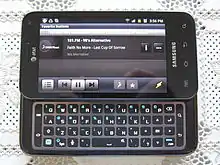
Winamp for Android is a mobile version for the Android (version 2.1) operating system, released in beta in October 2010 with a stable release in December 2010.[87] It includes syncing with Winamp desktop (ver. 5.59 beta+) over USB or WiFi.[88] It was received with some enthusiasm in the consumer blog press.[89][90][91] The app was removed from the Play Store in 2014.
It was reported by TechCrunch that a redesigned Android app was planned alongside the announcement of the development of Winamp 6.[86]
Macintosh
In 1997 Nullsoft also released MacAmp, an Apple Macintosh equivalent of Winamp.
In October 2011, Winamp Sync for Mac was introduced as a beta release. It is the first Winamp version for the Mac OS X platform and runs under version 10.6 and above. Its focus is on syncing the Winamp Library to Winamp for Android and the iTunes Music Library (hence the name, "Winamp Sync for Mac"). Nonetheless, a full Winamp Library and player features are included. The developer's blog stated that the Winamp Sync for Mac Beta would pave the way for future Winamp-related development on Mac[92] and a fully featured media player as Winamp on Windows.[93] However no further development occurred.
Linux

An early alpha preview of Winamp3 for desktop Linux was developed in October 2001,[94] but the project was not pursued. Nonetheless some versions of Winamp for Windows are functional using Wine.
DOS
DOSamp for DOS operating systems was released in 1997. The software was soon abandoned by Nullsoft to focus on the Windows version (Winamp).
Easter eggs
Winamp has historically included a number of Easter eggs: hidden features that are accessible via undocumented operations. One example is an image of Justin Frankel, one of Winamp's original authors, hidden in Winamp's About dialog box.[95] The included Easter eggs have changed with versions of Winamp, and over thirty have been documented elsewhere.[96]
Derivative works
Unagi is the codename for the media playback engine derived from Winamp core technologies. AOL announced in 2004 that Unagi would be incorporated into AOL Media Player (AMP), in development.[97] After beta testing, AMP was discontinued in 2005, but portions lived on in AOL's Web-based player.[98]
See also
- MacAmp
- Audacious
- XMMS
- qmmp
- List of media players
- Comparison of media players
- List of feed aggregators
- Comparison of feed aggregators
- List of audio conversion software
References
- Owen, Darren (aka DrO). "A Winamp Developer stating the toolkit and current Microsoft Visual C runtime version winamp is built on". Retrieved January 1, 2014.
- "The Programming Languages Beacon". Archived from the original on May 30, 2012. Retrieved February 9, 2014.
- TariK. "Nullsoft developer documentation instructing plugin developers what languages Winamp plugins are designed to be coded in". Nullsoft. Retrieved January 1, 2014.
- "THE HISTORY OF WINAMP!". June 2, 2011. Archived from the original on February 4, 2013. Retrieved November 6, 2015.
- Saltzman, Marc (March 26, 1998). "Sounding off: MP3 heading for mainstream?". CNN. Lists Boldyrev as "one of the developers at Nullsoft" of Winamp.
- Millard, Andre (December 5, 2005). America on Record: A History of Recorded Sound (2 ed.). Cambridge University Press. p. 391. ISBN 978-0521835152.
- Mengyi Pu, Ida (November 3, 2005). Fundamental Data Compression. Butterworth-Heinemann. p. 220. ISBN 978-0750663106.
- Bronson, Po (July 1998). "Rebootlegger". Wired. Retrieved April 7, 2007.
- Morrison, Kelly Green; Whitehouse, Karen (2006). "Power of 10: The past, present, and future of digital living". Top 10 downloads of the past 10 years. CNET Networks, Inc. Archived from the original on July 20, 2006. Retrieved July 26, 2006.
- "AOL – Who We Are – History". AOL.COM. October 19, 2004. Archived from the original on October 19, 2004. Retrieved April 9, 2004.
- "Winamp's woes: How the greatest MP3 player undid itself". Retrieved January 2, 2018.
- Winamp, Winamp (June 15, 2020). "Download Winamp 5.8". Winamp Official. Archived from the original on June 15, 2020. Retrieved June 15, 2020.
- Evangelho, Jason. "Winamp 5.8 Has Been Officially Released And Supports Windows 10". Forbes. Retrieved June 15, 2020.
- Mariano, Gwendolyn (May 1, 2002). "Winamp glitch may benefit open source". CNET News. Retrieved March 28, 2010.
- "Winamp Features Comparison". Winamp.com. Archived from the original on December 19, 2013. Retrieved March 28, 2010.
- Dixon, Douglas; Dreier, Troy; France, Jasmine (August 6, 2006). "Nullsoft Winamp 5.23 Review & Editor's Rating". CNET News. Retrieved March 28, 2010.
- Van Buskirk, Eliot (November 10, 2007). "Winamp Packs on Features for 10th-Anniversary Edition". Wired. Retrieved March 7, 2010.
- Hans-Christian Dirscherl (February 14, 2007). "Improved Unicode support with Winamp 5.33". PCWelt.de (in German). Archived from the original on August 7, 2011. Retrieved June 28, 2010.
Winamp 5.33 especially improves Unicode support.
- Graffeo, Deana (September 14, 2005). "AOL Introduces New Podcast Offerings" AOL; Time Warner. Retrieved March 7, 2010.
- Hart-Davis, Guy (January 4, 2008). How to do Everything with iPod & iTunes, 4th ed. pp. 306–309. ISBN 978-0-07-226387-9. Retrieved March 7, 2010.
- Winamp.com (December 2, 1998). "New Features listing". Archived from the original on December 2, 1998. Retrieved April 7, 2007.
- Gibbs, Mark (July 17, 2000). "The Elephant remembers to remember audio". Network World. 17 (29): 40. Retrieved March 28, 2010.
- Smith, Will (February 2000). "Complete Guide to MP3s". Maximum PC. Future US, Inc. 5 (2): 44. Retrieved June 28, 2010.
- "Winamp Plug-ins". Winamp.com. Nullsoft Inc. November 24, 1998. Archived from the original on December 5, 1998. Retrieved March 28, 2010.
- "Winamp Developers". AOL, AOL Developers Network. January 4, 2008. Retrieved March 28, 2010.
- Robertson, Michael; Simpson, Ron (1999). The official MP3.com guide to MP3. MP3.com. ISBN 978-0-9670574-0-8.
- "NotSoFatso NSF Player Plugin" Archived March 30, 2010, at the Wayback Machine. slickproductions.org (Slick Productions). Retrieved June 22, 2010.
- "nezplug++". angelfire.com. Retrieved January 2, 2018.
- "Several GSF-compatible Winamp Plugins". Fantasy Anime;
- "Chipamp Winamp Plugin bundle" Archived July 6, 2010, at the Wayback Machine Chipamp.com. Retrieved June 22, 2010.
- Tidwell, Jenifer (November 2005). Designing Interfaces:Patterns for Effective Interaction Design. O'Reilly Books. ISBN 978-0-596-00803-1. Retrieved June 23, 2010.
- Beggs, Josh; Thede, Dylan (2001). Designing Web Audio. O'Reilly Media. p. 191. ISBN 1-56592-353-7. Retrieved June 22, 2010.
- Hacker, Scot (2000). MP3: The Definitive Guide. O'Reilly Books. p. 141. ISBN 1-56592-661-7. Retrieved June 23, 2010.
- As of June 2010, https://web.archive.org/web/20131219003427/http://www.winamp.com/skins lists over 1900 Classic skins and over 700 Modern skins.
- Dabbs, Alistair (2002). Interface Design: Effective Design of Graphical User Interfaces. Watson-Guptill. ISBN 0-8230-2516-0. Retrieved June 22, 2010.
- Hacker, p.141.
- As of June 2010, 1001 Winamp Skins Archived January 11, 2014, at the Wayback Machine lists over 3000 Winamp skins in over 20 categories. Skinz.org Archived January 11, 2014, at the Wayback Machine lists over 500 Winamp skins.
- "Gnome-Art Skins". Archived from the original on January 13, 2016.
- Tidwell, p. 308.
- Tidwell, p. 286.
- Beggs, p. 190.
- Murray, John (July 2002). "Building the Lo-Fat Linux Desktop". AUUGN. AUUG Inc. 23 (2). ISSN 1035-7521. Retrieved June 22, 2010.
- Hacker, p.78.
- "Winamp Frequently Asked Questions – Skins". winamp.com. AOL. Archived from the original on December 19, 2013. Retrieved June 23, 2010.
- Ranjan, Parekh (2006). Principles of Multimedia. Tata McGraw-Hill Education. p. 249. ISBN 007-05-88-333. Retrieved June 25, 2012.
- Neal, Ryan W. (November 21, 2013) Winamp R.I.P.: Celebrating The Life Of The Nullsoft's Revolutionary MP3 Player. International Business Times. Retrieved November 25, 2013.
- April 21, 1997 release date extracted from Winamp.exe 0.20a binary. This version still plays some constant-bit-rate MP3 files on Windows XP SP3, but can crash when paused and unpaused. Retrieved March 28, 2010.
- Haring, Bruce (2000). Beyond the Charts: MP3 and the Digital Music Revolution. p. 101. ISBN 9780967451701. Retrieved March 7, 2010.
- License info from Winamp 1.006 Help menu.
- https://www.silicon.co.uk/mobility/mobile-apps/tales-tech-history-winamp-220495
- Version 1.006 release date from help screen, version from executable binary.
- "Playmedia News". Playmedia. Archived from the original on June 22, 2008. Retrieved April 1, 2007.
- "Technology/ Inventions". British History for KidsKS2. Retrieved February 3, 2018.
- "Winamp v2.62 mp3 decoding quality test results". mp3decoders.mp3-tech.org. Archived from the original on November 10, 2017. Retrieved September 29, 2019.
- DEMO.MP3 15,592 bytes, 32 kbit/s, 22 kHz, recorded in "1997" "Exclusively for Nullsoft" by JJ McKay. Voice only, no music stinger.
- Kushner, David (January 13, 2004). "The World's Most Dangerous Geek". Rolling Stone. Archived from the original on March 21, 2007. Retrieved July 3, 2010.
- https://web.archive.org/web/19981203055250/http://www.winamp.com/winamp/overview.html
- Haring, Bruce (July 14, 1999). "Listening to parents, not college, worth $80M AOL loves how Frankel makes MP3 files sing". USA Today.
- Parekh, Ranjan (2006). Principles of Multimedia. Tata McGraw-Hill. ISBN 978-0-07-058833-2. Retrieved March 31, 2010.
- Mook, Nate (August 10, 2002). "Winamp3 Makes its Official Debut". Betanews Inc. Retrieved March 31, 2010.
- Release date from "Winamp.com homepage for version 2". Nullsoft. Archived from the original on September 25, 2003. Retrieved March 31, 2010.
- "Winamp.com homepage". Nullsoft. Archived from the original on September 20, 2003. Retrieved March 31, 2010.
Almost As New As Winamp 2, Nullsoft Winamp3
- "Winamp 3 for Linux". FileForum. Betanews Inc. October 9, 2001. Retrieved March 28, 2010.
- Richman, Eddy "DJ Egg". ""Why no Winamp2 Download" (post #4)". (forum post by developer)
- "Winamp Media Player FAQ". Media Player Help. Winamp.com. Archived from the original on December 19, 2013. Retrieved March 28, 2010.
- "Winamp Media Player FAQ". Media Player Help. Winamp.com. Archived from the original on December 19, 2013. Retrieved July 6, 2010.
- Developer credits extracted from Winamp 5.55 credits screen. Retrieved March 28, 2010.
- "Winamp Media Player Version History". Winamp.com, Media player help. Retrieved March 28, 2010.
- "AOL Announces Winamp 10th Anniversary Edition". AOL.com (press release). AllBusiness.com. Retrieved June 23, 2010.
- http://www.last100.com/2007/09/17/winamp-goes-where-itunes-doesnt-dare/
- "Winamp 5.5 Changelog". forums.winamp.com. Archived from the original on December 19, 2013.
- https://winfuture.de/news,59877.html
- Farivar, Cyrus (November 20, 2013). "After 15 years of llama-whipping, AOL shuts down Winamp for good". Ars Technica. Retrieved November 20, 2013.
- "Winamp 5.666 released". Nullsoft. Archived from the original on December 19, 2013. Retrieved November 26, 2013.
- "Winamp Cloud". Nullsoft. Archived from the original on September 1, 2013. Retrieved November 26, 2013.
- DrO, Winamp/ShoutCast developer. "Winamp 5.666 released". Nullsoft. Archived from the original on December 19, 2013. Retrieved November 26, 2013.
- "AOL reportedly wants to sell Winamp to Microsoft". The Verge. November 21, 2013. Retrieved November 21, 2013.
- "Microsoft in Talks To Buy SHOUTcast And Winamp From AOL". Broadcasting World. Retrieved November 28, 2013.
- Lunden, Ingrid (January 1, 2014). "AOL Sells Winamp And Shoutcast Music Services To Online Radio Aggregator Radionomy". TechCrunch. AOL.
- "Winamp lives on after acquisition by Radionomy". The Verge. January 14, 2014. Retrieved January 14, 2014.
- Lunden, Ingrid. "AOL Sells Winamp And Shoutcast For $5-10M To Radionomy, Takes 12% Stake in Belgian Digital Audio Startup". techcrunch.com. TechCrunch. Retrieved January 14, 2014.
- Popa, Bogdan. "Winamp Has a New Owner, Relaunch Possible Once Again". Retrieved January 2, 2018.
- Serea, Razvan (September 16, 2018). "Llama's not dead, Winamp 5.8 Beta leaks online". NeoWin. Retrieved September 18, 2018.
- Deahl, Dani (October 15, 2018). "Winamp is coming back as an all-in-one music player". The Verge. Retrieved October 19, 2018.
- "Winamp 5.8 Beta, Build 3660 (official)". Winamp. October 19, 2018. Archived from the original on October 19, 2018. Retrieved October 19, 2018.
- "Winamp returns in 2019 to whip the llama's ass harder than ever". TechCrunch. Retrieved October 15, 2018.
- "Winamp Review: One of the Best Android Music Apps Around". August 11, 2011. Retrieved January 2, 2018.
- "Winamp for Android: now in beta". Winamp blog. October 20, 2010. Archived from the original on December 18, 2013. Retrieved February 6, 2016.
- Conneally, Tim (December 28, 2010). "The not-so-obvious top 15 Android apps for 2010". Beta News.
- Flatley, Joseph L. (October 21, 2010). "Winamp comes to Android, one of our childhood dreams is realized". Engadget.
- Wilson, Mark. "Winamp for Android 1.4.10 - Audio, Video & Photo - Downloads". Retrieved January 2, 2018.
- "Introducing Winamp for Mac Sync Beta – Winamp Blog". Blog.winamp.com. Archived from the original on December 19, 2013. Retrieved November 2, 2011.
- https://www.pawelporwisz.pl/winamp/winamp_help_mac.php
- https://web.archive.org/web/20011107175804/http://www.mp3newswire.net/stories/2001/winamp3beta.html
- Beggs, Josh; Thede, Dylan (2001). Designing Web Audio. "O'Reilly Media, Inc.". p. 189. ISBN 9781565923539.
- Wolf, David; Wolf, Annette. "Application Easter Eggs – Winamp". The Easter Egg Archive. Archived from the original on June 14, 2011. Retrieved September 15, 2011.
- "AOL: new players, new browser (Polish)" Archived July 17, 2011, at the Wayback Machine PC World – Polish edition (in English), December 13, 2004.
- Mook, Nate (December 20, 2005) "AOL Discontinues new Media Player". Betanews.com. Retrieved March 31, 2010.
Further reading
- Farivar, Cyrus (June 24, 2012). "Winamp's woes: how the greatest MP3 player undid itself". Ars Technica.
External links
| Wikimedia Commons has media related to Winamp. |
- Official website

- Winamp Skin Museum
- Winamp Heritage - archive of Winamp resources